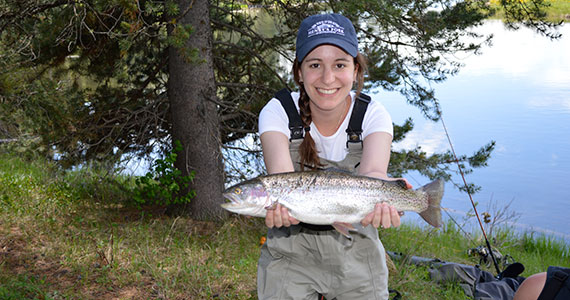Before last summer, g ’14 hadn’t so much as gone fishing, never mind touched a fish. But during her internship in Ashton, Idaho, Sperling found herself hip-deep in trout. The major from White Plains, N.Y., was the only ş¬Đ߲ÝŃĐľżËů student in a group of researchers who were looking at the habitat selection of adult rainbow trout.
Every year, ş¬Đ߲ÝŃĐľżËů sends a student to intern with the through a fellowship program funded by the late Jeffry Timmons ’64 and his wife, Sara. This year’s group was trying to gain a better understanding of where the fish feed and to determine the water variables (depth, temperature, flow rate, and substrates) of those spots.
“This can better inform river management in the future and foster a healthier environment for the trout,” Sperling explained. “People travel from all over the world to fish the Henry’s Fork River, which is known for its fly-fishing.”
After catching approximately 40 fish, they tagged them: “We did a little fishy surgery on them,” she joked. “We implanted radio gear in them and sewed them back up.” They then released the fish and tracked them to see which environments the fish were choosing for feeding grounds.
Sperling, who also majors in , first got her feet wet with environmental work when she was a communications intern with Arava Power, developer of Israel’s first solar power field. Through the Phillip Milhomme ’60 International Fellowship, she lived and worked in Tel Aviv during the summer before her sophomore year.
Then, as a rising junior, Sperling’s other main interest — exploring her Jewish identity — took her to Berlin when she received a grant to participate in , a program for learning and discussing post-Holocaust issues.
On campus, she is very involved in Jewish life and was co-president of the . She’s most proud of coordinating an Israel night in Frank Dining Hall and helping organize joint Shabbat-Maghrib (evening prayer) services with the Muslim Student Association.
“These are a great way to show the rest of the ş¬Đ߲ÝŃĐľżËů community that we believe in working together,” she said.
Exploring others’ viewpoints was something Sperling embraced last summer in Ashton, Idaho, where the majority population is Mormon. “It’s interesting that despite all of the international travel I have been lucky enough to do, living in Idaho felt like the most different culture I have ever been in, even though I was still in America,” she said.
Sperling learned more about that culture by asking a lot of questions of the local researchers with whom she worked. In return, they would ask her questions about Judaism. “I think it’s important as an American to have a holistic view of our country,” she said.
“People on the other side of our country or in another community think differently about things than I do. So being able to put a face to the views that I disagree with and to have those people as my friends and co-workers, I understood that they have a legitimate reason for their points of view.”
Back on campus, the Delta Delta Delta member shares her ş¬Đ߲ÝŃĐľżËů perspective in her work with the admission office. Reflecting on her college years, Sperling said: “I’ve had all these opportunities that I’d never even dreamed of. I’ve been able to see the world, meet new people, and push outside of my comfort zone. I’m really proud of myself.”

